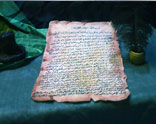The Imamate and Inner Guidance of Man
Imamate & Caliphate
One of the functions and attributes of the Imamate (imamah) is to extend inner guidance to man. This is something different from outer guidance in matters of law and the shari'ah; it is a distinct and lofty station bestowed by God on a select and precious few among His creation, men who, themselves strongly drawn and attracted to God and fully aware of all the variations of human behavior and the various degrees of faith and knowledge people possess, can influence their thoughts and inner beings. They illuminate the hearts of the ummah with inner knowledge and aid them in the refinement of their souls and their inward journeying, always bearing in mind the great multiplicity to which they are subject. It then becomes incumbent on men to follow them and to align themselves with the guidance they provide, thus guarding themselves against falling into the pit of instinctual desires and corrupt longings.
Some of the great prophets, after their determination and steadfastness had been duly tested and their spiritual strength had been fully proven, and they had attained the stage of total certainty, gained this station of inner guidance with which we are concerned.
Likewise, it can be deduced from numerous verses of the Quran that the Inerrant Imam (Imam al-ma'sum), who is situated at the highest rank of spiritual life, is also entrusted with the task of inner guidance, for he is a channel of divine grace which comes to him inwardly from the suprasensible realm.
The Glorious Quran specifies certain conditions for the office of Imamate: ﴾We have chosen from among them Imams who at Our command shall guide men to the right path, for they are patient and steadfast and have certain knowledge of Our signs.﴿1
What is meant here by guidance is inner guidance, not legal guidance, for to guide others in an outward sense by exhorting them to follow the truth is a duty for everyone, according to the command of the shari'ah, and fulfilling it is not contingent on being an Imam, patient and steadfast, or having certain knowledge of God's signs, nor is it necessary to traverse different stages and degrees in order to perform it. However, guidance in accordance with divine command is a station that can be attained only through divine appointment, and is possible only for the one who, when confronted with irksome events and occurrences, passes the divine test implicit in them by displaying exemplary powers of endurance; who consistently resists the pollution of sin and struggles against all forms of lowliness and triviality. Equipped with such virtues, he attains the lofty rank of the certain knowledge of God's signs and the station of Imamate, which is also the station of inner guidance. The Quran says: ﴾We have appointed them Imams in order that they might guide in accordance with Our command" (21:73), and, in another verse, "A day on which We shall call forth each group with its Imam.﴿2
When Ibrahim had completed all the tasks with which God had tested him, God addressed him as follows: ﴾I appoint you to the station of Imamate and the leadership of man Ibrahim then asked: 'Will you also grant this station to my progeny?' God said: 'The covenant of My Imamate will not be granted to wrongdoers.'﴿3
Several points can be derived from this verse
First, the Imamate of Ibrahim was connected directly to the manner in which he had confronted the tests and trials of prophethood. After he had displayed his strength by passing through all those stages, God revealed to him that he was to be further honored with the lofty office of Imamate, with responsibility for the inner guidance of mankind, the refinement of their souls, the maturing of their spiritual capacities, and, in general, the preservation of the truth.
Second, Ibrahim was addressed by God in this manner when he was approaching the final part of his life and at a time when he was fully established in the rank of prophet and already had responsibility for the guidance of his ummah in matters of belief and conduct. God nonetheless promised him an additional station, which proves that the office of Imamate, with the ability to exercise inner influence on the ummah in order to advance on the inner path, was a higher and more exalted office than his prophethood.
Third, immunity from the pollution of sin ('ismah) is one of the conditions of Imamate. For the verse proclaims that wrongdoers who transgress the bounds of piety and inerrancy, whether they wrong others or their own selves, will be denied the rank of Imamate.
Fourth, the Imamate is a divine covenant, bestowed only on the just, the pious, and the utterly pure; it is only they who aid and guide the ummah. The Imamate is not, then, a station which is at the disposal of men to be awarded to whomever they see fit
Fifth, prophethood and Imamate can be combined in a single person, as was the case with Ibrahim. For he had already received revelation in his capacity as a prophet, correcting men's erroneous beliefs by means of decisive arguments and proofs, and in the very process of doing this, he had acquired the strength and capacity needed for inner guidance, so that the gate of Imamate was opened before him.
Finally, the verse indicates that members of Ibrahim's progeny who are not wrongdoers (zalimin) will be granted the station of Imamate. There can be no doubt that the most righteous of God's servants from among that progeny were the Prophet, peace and blessings be upon him and his family, and the Inerrant Imams, so they must count as Imams from Ibrahim's line who were entrusted with inner guidance and the knowledge of the unseen.
Imam Ja'far al-Sadiq, peace be upon him, is reported in al-Kafi to have said:
"Before appointing Ibrahim as prophet, God Almighty appointed him His servant. Before ennobling him with His friendship, He bestowed on him the rank of messenger hood. Before granting him the rank of Imamate, He made him His sincere and devoted friend. It was therefore after Ibrahim had attained a whole series of high ranks that he was given the station of Imamate."4
Numerous traditions exist affirming and emphasizing the need for an Imam to be present among the people in order to guide them. These traditions indicate that as long as the human species exist in this world, a proof of God and the truth must also exist to provide and protect the intellectual, social and credal framework for the ummah. This proof is none other than the Imam, the Friend of God, who in his very person is a living exponent and exemplar of true Islam.
The Commander of the Faithful, 'Ali, peace be upon him, said: "The Family of Muhammad, peace and blessings be upon him and his family, are hike the stars; as soon as one of them sets, another rises."5
Imam Ja'far al-Sadiq, peace be upon him, said in the course of a sermon:
"God has illuminated His religion with the Imams from the Household of the Prophet and made them the abundant spring from which knowledge of religion gushes forth. Whoever recognizes the claims of the Imams, based on sound knowledge and insight, will taste the sweetness of faith and come to know the luminous and beautiful visage of Islam. For God has appointed the Imams to be His proof among men and their guide; has placed on their heads the crown of sublimity and leadership; caused the light of His Own splendor to shine on their beings; and sustained and supported them with inexhaustible heavenly power. It is only by means of causes that God's grace reaches His servants, and God does not accept men's knowledge of Himself except by means of their recognition of the Imam.
"The Imam is versed in all the complexities, problems and metaphoric aspects of revelation, and he is chosen by God from among the descendants of Husayn, peace be upon him. Whenever an Imam departs for the realm of eternity to meet God, he appoints another Imam from among his own offspring in order to illuminate the path men should travel. God has chosen all of them to lead the ummah in order that they should guide the people and judge justly among them.
"They are among the chosen descendants of Adam, Nuh, Ibrahim, and Isma'il. The jewel of their being shone in the world even before their bodies were fashioned of clay. God made their existence the substance of life for all men and the firm pillars of Islam."6
He said in another tradition:
"Even if there were only two people left on earth, one of them would be an Imam. The last person to close his eyes on the world will be the Imam, so that no one will be to argue before God that he was left without an Imam."7
al-A'mash asked Imam Ja'far al-Sadiq: "How will people benefit from the existence of an absent (gha'ib) Imam?" He answered: "In the same way that they benefit from the sun when it is hidden behind a cloud."8
Ishaq b. Ghalib relates the Imam to have said:
"The Imam is designated by God and the Messenger to be God's proof before men. Through the blessed existence of the Imam a link is established between God's servants and the suprasensible realm and God's grace flows down upon them. God will not accept the deeds of His servants unless they are loyal to the Imam. God does not abandon His servants to their own devices after creating them; instead, by means of the Imam, he lays out the path of piety before them and thus establishes His proof."9
Imam al-Baqir, peace be upon him, said:
"I swear by God that from the time God took Adam's spirit and conveyed him to the realm of eternity, He has never left the earth empty of an Imam. Hereafter, too, the world will never be without the existence of an Imam, so that God's proof will always be present among His servants."10
Abu Khalid al-Kabuli says that he once asked the fifth Imam to interpret the verse ﴾So believe in God and His Messenger and the light He has sent you.﴿11 The Imam replied: "'I swear by God that that light (al-nur) is the Imam. The brilliance of the light of the Imam in the heart of the believer is greater than that of the sun. It is the Imam who illuminates the hearts of the believers. God prevents the brilliance of that light from reaching the hearts of whomsoever He wills, this being the explanation for the darkness of their hearts."12
al-Saduq writes in his 'Ilal al-Sharai':
"Jabir once asked Imam al-Baqir, peace be upon him, why men need prophets and Imams. He replied that the existence of prophets and Imams is indispensable for the continuance and welfare of the world. For it is by means of them that God wards off His punishment from men. God says in the Quran: ﴾(O Muhammad) as long as you are among them, punishment shall not descend on them.﴿13
The Most Noble Prophet himself, peace and blessings be upon him and his family, said:
"Just as the stars bestow safety On the inhabitants of the heavens, the People of my House grant security to the inhabitants of the earth. If the stars in heaven are destroyed, it will be a catastrophe for the inhabitants of the heavens, and if the People of my House are no longer to be found among men, the whole earth will be overtaken by disaster.
"What is meant by the People of the House are those leaders obedience to whom God has conjoined with obedience to Himself in the verse, ﴾O you who believe, obey God, the Messenger, and the Holders of authority﴿14. The Holders of Authority from the People of the Prophet's House are adorned with inerrancy and utter purity; they never disobey any of God's commands and are always guided and supported by Him. Their deeds are beyond the reach of crookedness and deviation, and their feet are firmly planted on His straight path. It is through the blessed existence of these great ones that God's servants receive their sustenance, cities become prosperous, and the rainfall descends. The Holy Spirit always accompanies them, and there is never any separation between them and the Quran."15
Muhammad b. Fudayl asked Imam al-Rida, peace be upon him, whether the earth could subsist without an Imam. He answered that it could not. Muhammad b. Fudayl continued: "It has been related to us from Imam Ja'far al-Sadiq that the world will never remain without a proof (hujjah) and an Imam, for were it to do so, the people of the world would instantly be caught up in God's wrath." The Imam then said: "The earth will never be without an Imam. Were there to be no Imam, destruction and collapse would be the ineluctable fate of the world."16
* Imamate and Leadership. Lessons on Islamic Doctrine, Lesson Seventeen: "The Imamate and Inner Guidance of Man" . Sayyid Mujtaba Musavi Lari. Translated by: Hamid Algar. Published by: Islamic Education Center, 7917 Montrose Road, Potomac, MD 20854. Reproduced with permission by the Ahlul Bayt Digital Islamic Library Project team.
1- 32:24
2- 17:71
3- 2:l24
4- al-Kulayni, al-Kafi , Vol. I, p. 175.
5- al-Radi, Nahj al-Balaghah, p. 146.
6- al-Qunduzi, Yanabi' al-Mawaddah, pp. 23, 524.
7- 6. al-Kulayni, al-Kafi, Vol. I, p. 180.
8- al-Qunduzi, Yanabi' al-Mawaddah, p.21.
9- Hurr al-'Amili, Ithbat al-Hudat, Vol. I, p.247.
10- al-Kulayni, al-Kafi, Vol. I, p. 179.
11-(64:8)
12- Ibid, Vol. I, p. 195.
13- (8:33}
14- (4:59)
15- al-Majlisi, Bihar al-anwar, Vol. XXIII, p. 19.
16- al-Kulayni, al-Kafi, Vol. II, p. 179.




















